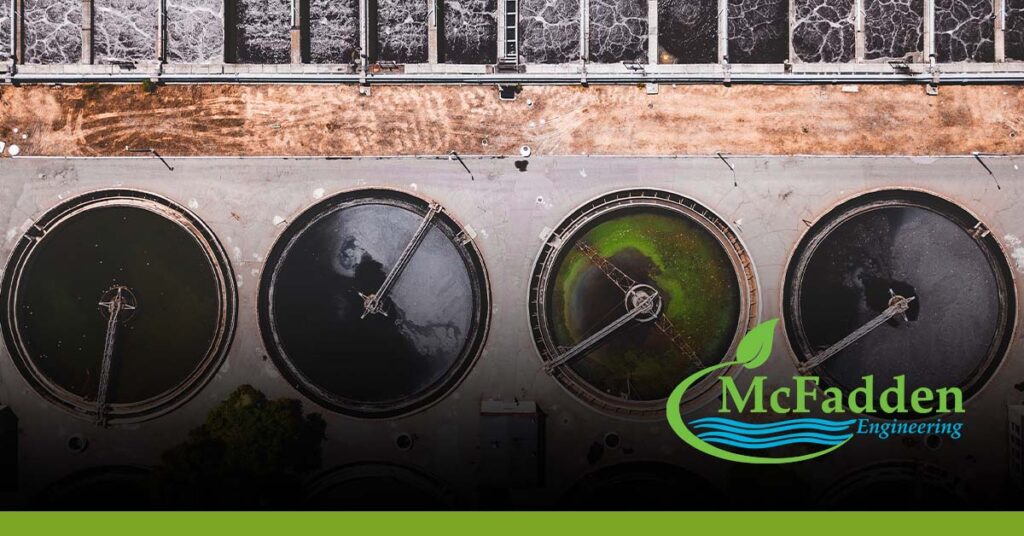Wastewater Permitting Options in the State of Alabama
June 21, 2022

The major aim of wastewater treatment operations is to create safe water by extracting pollutants, removing contaminants and killing pathogens so that water reaches a permissible level of cleanliness to be discharged into nearby bodies of water and ecosystems. In addition to creating safe, reusable water, wastewater treatment facilities must follow regulations set at local, state and federal levels. The environmental permitting process can be tricky to navigate, as standards are always evolving. It can be hard for businesses to keep up.
In this blog, we discuss all the environmental permitting options for wastewater treatment facilities in the state of Alabama and how McFadden can help bridge the gap between your business and regulatory principles.
Water Reclamation in Alabama
The state of Alabama has two classes of reuse water: Class A and Class B. Water reuse can be defined as planned or unplanned and can provide alternatives to existing water supplies. In addition, water reuse applications can be used to ensure water security, sustainability, and quality. These two classes are defined as follows:
- Class A Reuse Water—Secondary treated wastewater that has, at minimum, received additional treatment and disinfection.
- Class B Reuse Water—Secondary treated wastewater that has, at minimum, been disinfected.
Class A and Class B water can be reused in numerous applications including the following:
- Fodder
- Fiber crops
- Ornamental nursery stock
- Sod and seed crops not intended for human consumption
- Pasture for animals not producing milk for human consumption
- Irrigation for golf courses
- Highway medians and roadside vegetation
- Cemeteries
- Other applications with ADEM approval
Options for Permitting Treated Wastewater Discharge in Alabama
According to federal guidelines, states can maintain primary regulatory authority by following these specific permitting ordinances:
- General NPDES
- Individual NPDES
- Underground Injection Control (UIC)
- State Indirect Discharge (SID) to POTW
- Onsite from ADPH
National Pollutant Discharge Elimination System (NPDES) Permit
The regulations and laws surrounding Alabama’s NPDES permit are in place to regulate point sources that discharge pollutants to waters of the United States. There are two NPDES permits that wastewater companies can acquire. These include:
General
- Permit based on activities at facility
- Permit limits are already published and established by regulators (i.e. non-negotiable)
- Enrollment through notice of intent process
Individual
- EPA Forms are required presenting expected effluent quality and treatment system
- Permit limits based on waste load allocation (WLA) for receiving stream
- Limits can be negotiated based on WLA results
Underground Injection Control (UIC) Permit
Any wastewater treatment facility that plans to inject fluid into the subsurface via an injection well must receive a UIC permit. A few keys to this permit are as follows:
- Requirement of land area with critical soils evaluation
- Permit limits are usually less stringent than a NPDES permit
- Subsurface Discharge
–Traditional disposal methods
–Injection wells
One aspect of this permit that should be noted is that the point of compliance for the permit is in the groundwater. Monitoring of groundwater for key parameters based on the characteristics of the waste stream will be required adjacent to the injection area. Also, plans should be made during the design process to limit public access to the application area.
State Indirect Discharge (SID) Permit
In the state of Alabama, a company is required to obtain an SID permit if they meet one or more of the definitions for an industrial discharger:
- Subject to categorical pretreatment standards
- Industrial discharges over 25,000 GPD
- Discharge makes up 5% or more of the flow to a POTW
- Any discharge that could potentially have an adverse impact on the POTW
Alabama Department of Public Health (ADPH) Permit
In the state of Alabama, the ADPH permit is required for onsite sewage disposal systems that fall into one of the following categories:
- Residential use
- Small flow commercial (<1,500 GPD)
These systems have very strict sizing guidelines set forth in the ADPH onsite disposal regulations. However, there is typically no monitoring of effluent or groundwater required for these systems.
Permit Evaluation
Before you start your next project, it’s imperative that you understand the regulatory process, treatment requirements and evaluate your ROI for treatment and disposal options. In addition, you must review typical monitoring requirements and permit terms to ensure your wastewater treatment facility operator:
- Reads and understands your permit requirements and keeps it accessible
- Expects regulatory visits
- Maintains documents and keeps good records
Taking time to perform basic housekeeping in your wastewater plant can save time and efficiency in the long run.
McFadden Engineering has established relationships with local, state and federal regulatory agencies and can help navigate the environmental permitting process on our clients’ behalf. Based in Alabama with licenses to operate in Georgia, Florida, Louisiana, Mississippi and Tennessee, McFadden Engineering can serve as the liaison between your business and wastewater the environmental regulators. Get in touch today to find out how McFadden Engineering can help solve your wastewater treatment facility’s permitting needs.
